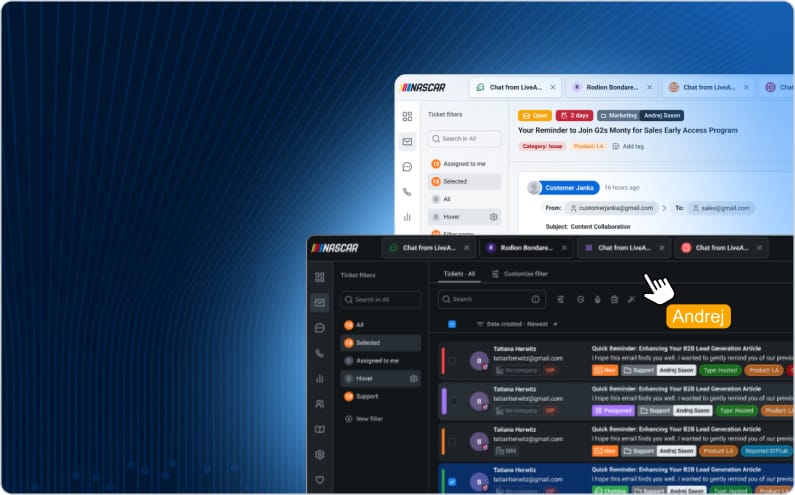Efficient customer service is no longer a luxury but a necessity. The right help desk and ticketing software can make all the difference, but with so many options available, how do you choose?
Welcome to our comprehensive guide on the best 18 free help desk and ticketing software available in 2024. This article will not only help you navigate the sea of choices but also highlight the benefits of these solutions. We will delve into a detailed comparison and analysis of each software, providing you with the insights you need to make an informed decision.
So, whether you’re a small business owner or a corporate executive, stay tuned as we unravel the world of ticketing and help desk software free of charges. Let’s embark on this journey to enhance your customer service experience without breaking the bank.
- A comparison chart of the top 5 free help desk software
- What is free help desk software?
- Does your business need a free ticketing system?
- Best 18 free help desk software and ticketing systems
- Essential features of free help desk software
- How to choose the right free help desk ticketing system? (In steps)
- Benefits of free ticketing systems
- Drawbacks of free ticketing systems
- Signs that you need to upgrade your free help desk software
- Conclusion
- Want to learn more?
A comparison chart of the top 5 free help desk software
These days, our schedules tend to be full to the brim, so, for your convenience, we have compiled the top 5 free help desk software solutions into one convenient comparison table. Whether you work in a small non-profit or operate a large enterprise, one of these 5 solutions will undoubtedly fit your ticketing system requirements.
| Solution | Capterra Rating | Number of Integrations | Free Version | Free Trial | Price per Month |
|---|---|---|---|---|---|
| LiveAgent | 4.7 | 220+ | YES | YES | $15/agent |
| HelpCrunch | 4.8 | 300+ | NO | YES | €8/agent |
| Gorgias | 4.7 | 140+ | NO | YES | $10/50 tickets |
| Jira | 4.5 | 500+ | YES | YES | $8.15/agent |
| HubSpot Service Hub | 4.5 | 1000+ | YES | YES | €18/2 users |
What is free help desk software?
Before diving head-first into the intricacies of free help desk solutions, let’s first look at some definitions. Free help desk software is a type of program or tool organizations can use to manage their customer service operations. As the name suggests, this tool is available at no cost.
Free help desk software typically includes features for ticket management, customer communication, reporting, and task automation. It usually allows businesses to track, prioritize, and solve customer support tickets more efficiently. Despite being free, it can still offer a range of functionalities to improve customer service, although it may have limitations compared to paid versions.
Does your business need a free ticketing system?
First and foremost, implementing a free ticketing and help desk solution allows businesses to improve their customer service efforts. A ticketing system allows organizations to manage and resolve customer inquiries and complaints more efficiently, leading to improved customer satisfaction.
From the company revenue standpoint, using a free help desk system is one of the best choices you can make. It has been observed that companies that provide exceptional customer experiences can increase their revenues by 4% to 8% more than their competitors. This underscores the significance of providing excellent customer service in driving business growth.
For instance, consider a hypothetical online retail company. By implementing a free ticketing system, they can streamline their customer service process. When a customer has an issue or question, they can simply submit a ticket. The system then automatically assigns this ticket to the appropriate department or individual. This ensures that no customer queries are overlooked and that each issue is resolved in a timely manner. As a result, customers are more satisfied with the service they receive, leading to increased customer loyalty and, ultimately, higher revenues for the business.
Best 18 free help desk software and ticketing systems
Ready to dive deeper into the universe of free help desk software? If you want to broaden your horizons, read on and learn the ins and outs of 18 free help desk and ticketing software and what makes them unique.
- LiveAgent
- HelpCrunch
- Gorgias
- Jira
- HubSpot Service Hub
- Zoho Desk
- HappyFox
- Freshdesk
- SysAid
- Zendesk
- Spiceworks
- Groove
- Mint Service Desk
- Hiver
- SolarWinds
- SupportBee
- Hesk
- Kayako
1. LiveAgent
LiveAgent is a comprehensive help desk software that offers multichannel support for businesses. The software is designed to streamline customer service processes and improve customer satisfaction. LiveAgent is that it supports over 40 languages, making it a globally accessible platform.
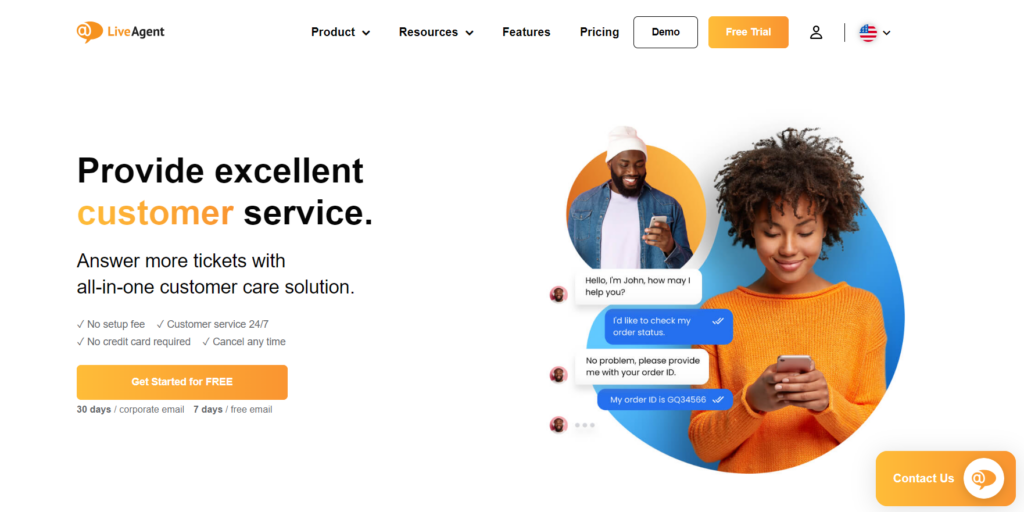
LiveAgent free plan features
Here are some features you can enjoy in LiveAgent’s free solution.
- Ticketing system
- Email ticketing
- Ticket transfers
- Customer portal
- Real-time dashboards
- Customer forum
- Knowledge base
- Customizable live chat button
- iOS/Android apps
- Security features
LiveAgent free plan limitations
Although robust, LiveAgent’s free plan is still missing some features included in its paid versions. Some examples include:
- Automation such as time and event rules
- Service level agreements (SLA)
- Canned responses
- Single sign on (SSO)
- Performance report
Pros
- The software is very easy to set up and use
- Helpful and knowledgeable customer support
- The system is stable and fast
Cons
- SSL has to be set manually for custom domains
- Inability to log into two browsers with the same account at once
- Tech support is available 24/7, but it is located in the EU
LiveAgent pricing
LiveAgent provides a free version of their software, albeit with some restrictions. They also offer a 30-day free trial for you to explore their services. If you wish to access more premium features, you can opt for one of their four paid plans. These include the Small plan at $15 per agent per month, the Medium plan at $29 per agent per month, the Large plan at $49 per agent per month, or the Enterprise plan at $69 per agent per month.
Author’s opinion
I found LiveAgent’s free help desk solution to be a comprehensive tool that offers a wide range of features. The software is user-friendly with an intuitive interface that makes it easy to navigate. The ticketing system is quite efficient, allowing for easy tracking and management of customer queries.
However, the free version of the software is not without its drawbacks. One of the main issues I encountered was the limited customization and automation options. While it does offer some level of customization, it is not as extensive as some users may like or need. Additionally, LiveAgent’s automation, may it be outstanding, comes only in the paid packages.
Overall, LiveAgent’s free help desk software is a solid choice for small to medium-sized businesses with tighter budgets. It offers a good range of features and is easy to use. However, businesses with specific customization needs or those that require robust reporting and automation capabilities may opt for a paid plan instead.
Customer review
“We have been using LiveAgent for help desk and support services and true to its word, we have seen a great transformation on our customer support system. Now, we are able to respond to customer requests much quicker and easily and have given our customers easily accessible customer support services at all times.”
Source: Capterra
To test LiveAgent’s features for yourself, sign up for a 30-day free trial and start transforming your business now!
2. HelpCrunch
HelpCrunch’s help desk software offers a range of customer communication tools designed to streamline customer service and improve customer engagement. The platform is known for its user-friendly interface and robust features that can be customized to fit the needs of any business.
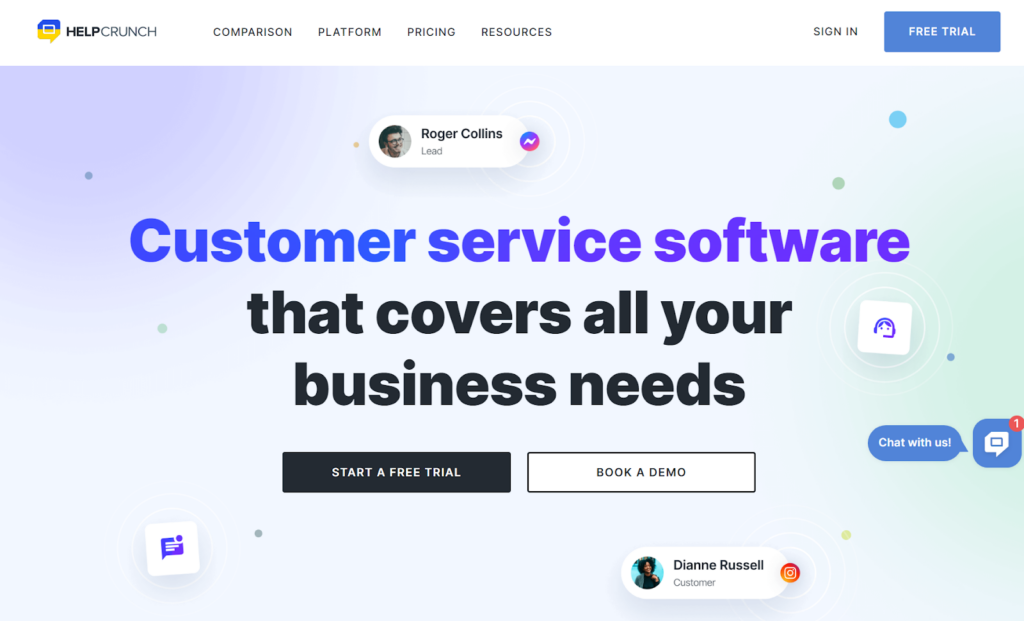
HelpCrunch does not offer a free version, however, its free trial lets you use the fully-featured Pro plan with 5 team members for 14 days.
Pros
- New features are constantly being developed and updated
- User interface is easy to navigate and use
- Reactive and helpful customer support
Cons
- Reporting can be deemed insufficient for some users
- Insufficient number of native integrations
- Limited customization options
HelpCrunch pricing
HelpCrunch is available in three main pricing packages. The Basic package costs €8 per team member/month billed annually, or €11 per team member/month billed monthly. The Pro plan is available for €14 per team member/month billed annually, or €18 per team member/month billed monthly. You can purchase the most extensive, Unlimited plan for €347 for unlimited number of team members and 50,000 emails billed annually, or €434 for unlimited number of team members and 50,000 emails billed monthly. Besides these pricing tiers, you can test HelpCrunch out with a 14-day free trial.
Author’s opinion
HelpCrunch’s platform is user-friendly and intuitive, making it easy to navigate even for those who are not tech-savvy. It offers a range of features such as live chat, email marketing, and knowledge base creation which have significantly improved our customer service efficiency. However, it’s worth noting that HelpCrunch does not offer a free version, which might be a deterrent for small businesses or startups on a tight budget.
One of the standout features of HelpCrunch is its live chat functionality. It allows for real-time interaction with customers, which can greatly improve response times and customer satisfaction levels. The software also provides detailed analytics and reporting.
On the downside, the software does have a few limitations. For instance, the customization options are somewhat limited, particularly when it comes to the design and layout of the chat widget. Additionally, the mobile app could use some improvements, as it lacks some of the functionalities available on the desktop version.
All in all, HelpCrunch is a robust help desk software that offers a wide range of helpful features. While it does have a few drawbacks and doesn’t offer a free version, its strengths in areas such as live chat and analytics can make it a worthwhile investment for businesses looking to enhance their customer satisfaction.
3. Gorgias
Gorgias’ help desk software offers a range of customer communication tools designed to streamline customer service and improve customer engagement. The platform is known for its user-friendly interface and robust features that can be customized to fit the needs of any business.
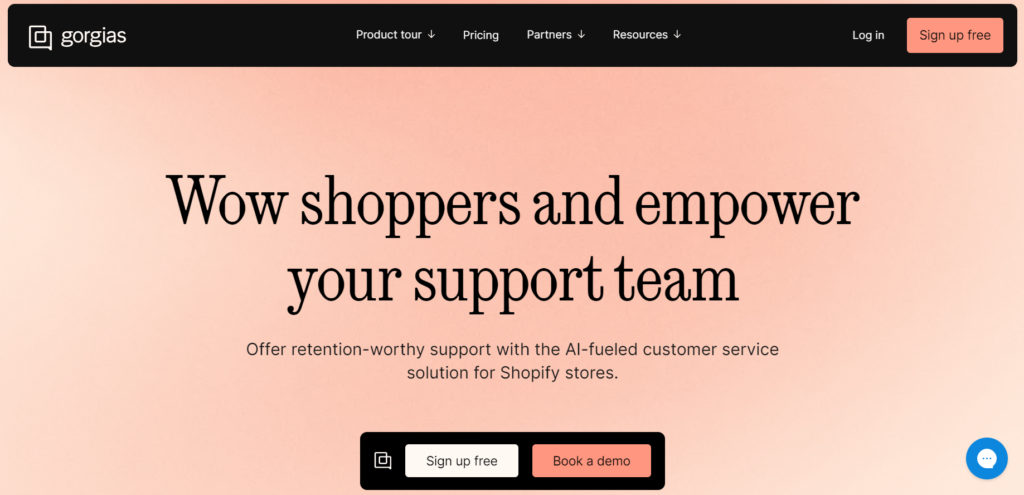
Gorgias does not offer a free version, but you can sign up for their 7-day free trial.
Pros
- The platform caters especially to Shopify stores
- It supports various communication channels
- Efficient collaboration features
Cons
- The system experiences occasional glitches
- Customization options are limited
- The ticket merge function can be a bit clunky
Gorgias pricing
Gorgias provides a range of subscription options, beginning with the Starter plan for $10 per month, which includes 50 tickets. The Basic plan costs $60 and includes 300 tickets, the Pro plan is $360 for 2,000 tickets, and the Advanced plan is $900 for 5,000 tickets. For those with more comprehensive requirements for a ticketing system, Gorgias offers an Enterprise plan with personalized pricing, the specifics of which can be acquired by reaching out to their sales department.
For those interested in testing the service before committing, Gorgias also offers a 7-day free trial.
Author’s opinion
Gorgias is primarily designed to integrate with various e-commerce platforms, making it easier to manage customer interactions across multiple channels. The software’s ability to automate responses to common customer inquiries is a significant time-saver, allowing customer service representatives to focus on more complex issues.
Of course, we have to talk about the negatives too. The user interface, while generally intuitive, can be a bit clunky at times. Additionally, the software occasionally experiences lag, particularly when handling high ticket volumes.
Another downside to Gorgias is its lack of a free version. While the software does offer a lot of value, smaller businesses or those with a tight budget may find the cost prohibitive.
Undoubtedly, Gorgias can significantly improve the efficiency of customer service operations. Its automation features and integration capabilities are particularly impressive. However, potential users should be aware of its occasional performance issues and lack of a free version.
4. Jira
Jira Service Management, formerly known as Jira Service Desk, is a software developed by Atlassian that provides IT service management (ITSM) and customer service functionalities. Jira was named after “Gojira”, the Japanese name for Godzilla, symbolizing its power to handle large amounts of work.
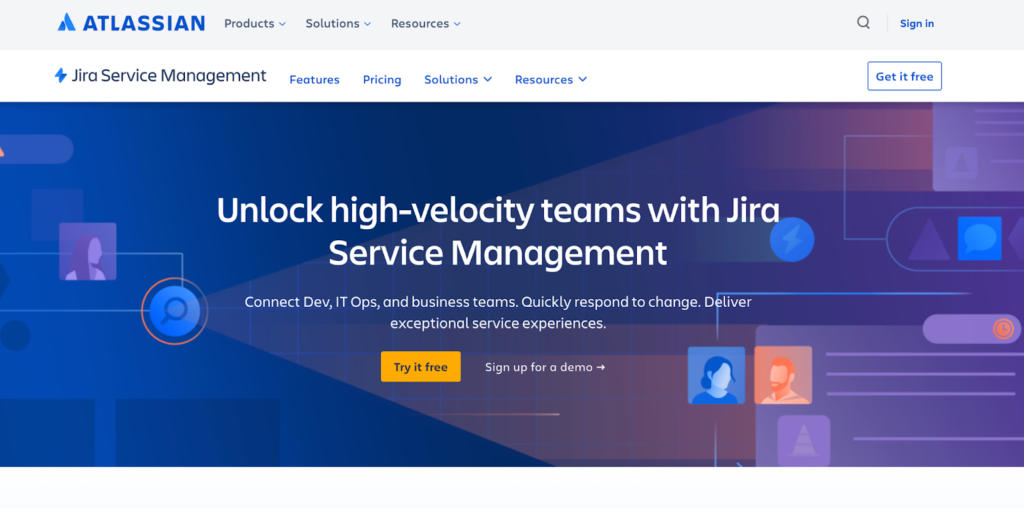
Jira free plan features
Let’s discuss some features Jira offers in the free plan.
- 2GB of storage
- Limited automation
- Community support
- Reporting and insights
- Security & Compliance features
- Customizable workflows
Jira free plan limitations
Some of the limitations of Jira’s free plan include:
- 24/7 premium support
- User roles and permissions
- Audit logs
- Data residency
- Anonymous access
Pros
- The software is very robust
- Focus on agile workflow
- The platform is customizable to fit users’ exact needs
Cons
- Mobile access is with browser-based usage can be a bit challenging
- Steep learning curve due to the system’s complexity
- Licensing can pose issues for some users
Jira pricing
Jira Service Management offers a variety of pricing plans, starting with a Free plan that covers basic features. More comprehensive plans include the Standard plan at $8.15 per agent monthly and the Premium plan at $16 per agent monthly. For larger teams with more demanding needs, there’s an Enterprise plan with pricing that can be customized, the specifics of which can be obtained directly from their sales team. Jira also provides a self-hosted solution at a cost of $42,000 for 500 users annually.
A free 30-day trial is available for their Standard and Premium plans, as well as for the self-hosted solution.
Author’s opinion
Jira Service Management’s software is a robust and comprehensive tool that is designed to streamline project management and issue tracking. The system is highly customizable, allowing users to tailor it to the specific needs of their team and project. The interface is user-friendly and intuitive, making it easy to navigate and manage tasks.
However, the learning curve for Jira can be quite steep, especially for those who are new to project management software. It took me a considerable amount of time to fully understand and utilize all of its features. Additionally, while the customization options are a strength, they can also be overwhelming and confusing at times.
Jira Service Management is a powerful tool that can greatly enhance project management and issue tracking. It’s best suited for larger teams or organizations that have the resources to fully utilize its features and can afford the investment.
5. HubSpot Service Hub
HubSpot Service Hub is a help desk software designed to streamline customer service processes. The software is part of HubSpot’s comprehensive suite of tools for marketing, sales, and service. Interestingly, HubSpot is that it was founded by two MIT graduates in 2006 and has since grown into a globally recognized brand.
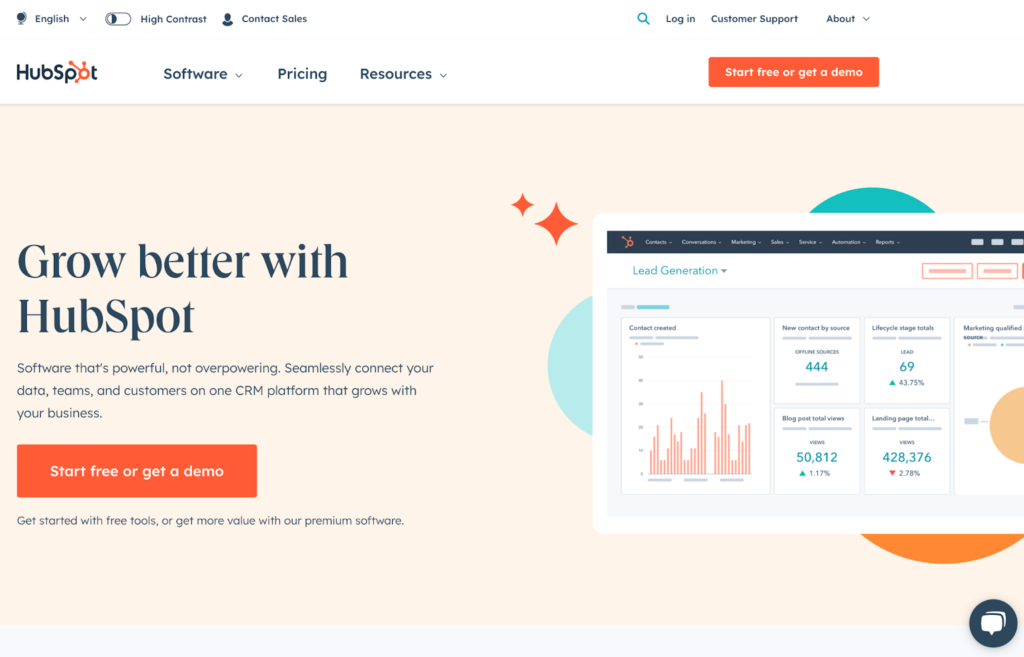
HubSpot Service Hub free plan features+
So, which features can be found in HubSpot Service Hub’s free plan?
- Ticketing system
- 1 shared inbox
- Reporting dashboard
- Up to 5 canned snippets
- Live chat
- Mobile app
HubSpot Service Hub free plan limitations
Some of the features excluded from HubSpot Service Hub free plan are:
- 1:1 technical support
- Conversation routing
- Simple ticket automation
- Calling
- Knowledge base
Pros
- Seamless integration with other HubSpot products
- Extensive reporting and analytics
- Helpful documentation with tutorials and FAQs
Cons
- The pricing can get quite expensive
- Occasional bugs are present
- Steep learning curve due to the system’s complexity
HubSpot Service Hub pricing
Small teams can utilize the Free version of HubSpot Service Hub. For larger departments, a Starter plan is available at €18 per user monthly. The Professional plan, priced at €450 monthly, is suitable for more comprehensive operations. Larger corporations with extensive requirements can opt for the Enterprise package at €1,200 monthly.
Before committing to a plan, you can test the HubSpot Service Hub through their complimentary 30-day trial.
Author’s opinion
HubSpot Service Hub’s software is user-friendly with an intuitive interface that makes it easy to navigate through different features. The ticketing system is well-structured, allowing for efficient tracking and management of customer issues.
On the other hand, one of the main issues I encountered was the steep learning curve for some of the more advanced features. While the basic functions are easy to grasp, getting a handle on the more complex tools can be quite challenging, especially for those without a technical background.
HubSpot Service Hub offers powerful help desk software with a range of impressive features. However, its complexity and cost may be a deterrent for some users. It’s a tool best suited for medium to large businesses that require a comprehensive customer service solution and have the resources to fully utilize its capabilities.
6. Zoho Desk
Zoho Desk is a cloud-based help desk software designed to help businesses deliver top-notch customer service. The platform is part of Zoho Corporation’s suite of business software, serving over 50 million users worldwide.
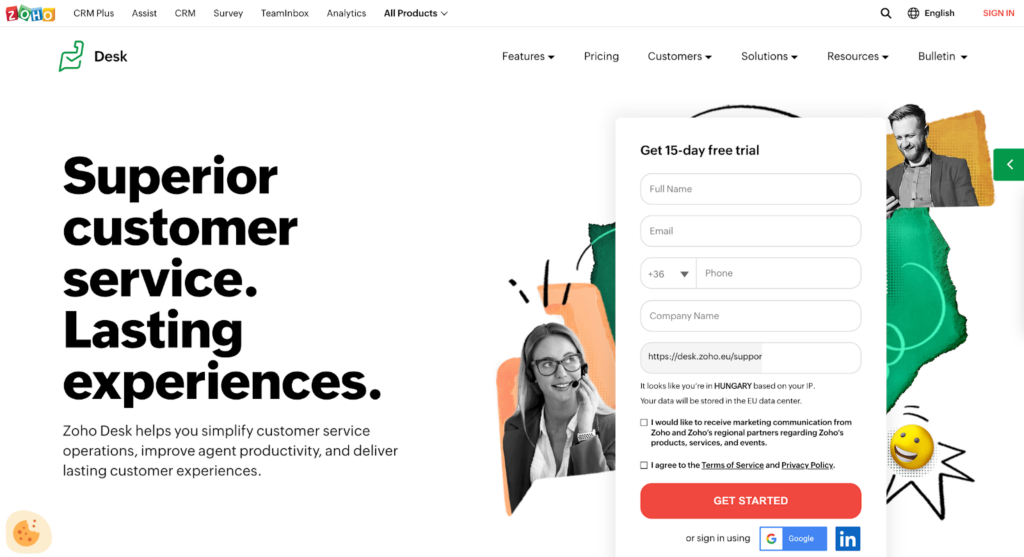
Zoho Desk free plan features
Some of the features in Zoho Desk’s free plan include:
- Email ticketing
- Ticket history
- Advanced search
- Help center
- Notification rules
- Priority-based SLAs
Zoho Desk free plan limitations
Here are some of the features you can only enjoy in higher paid tiers:
- Custom workflows
- Customer happiness ratings
- Agent collision detection
- Ticket overview dashboard
- SSL Certificate
Pros
- Simple and reliable ticketing system
- Substantial number of integrations
- The UI is simple to use and navigate
Cons
- Insufficient customization options
- The system can be quite laggy
- No native function to permanently close tickets after a specific time period
Zoho Desk pricing
Zoho Desk offers four different pricing options to accommodate a range of requirements, plus an extra one. The Free plan, which includes basic features, is available at no charge. The Standard plan is priced at €14 per agent each month, the Professional plan costs €23 per agent each month, and the Enterprise plan, which includes the most extensive feature set, is priced at €40 per agent each month. Additionally, there is Zoho Express for €7per agent each month with up to 5 users.
Zoho Desk also offers a complimentary 15-day trial for you to test the service before committing to any of these plans.
Author’s opinion
Zoho Desk is a robust help desk software that I found to be quite user-friendly and intuitive. The interface is clean and easy to navigate, making it simple to track, prioritize, and solve customer support tickets.
A downside of this solution is its laggy nature. There have been instances where the software became slow, especially during peak usage times. This can be frustrating when you’re trying to resolve customer issues promptly. Additionally, the mobile app could use some improvements. It lacks some of the features available on the desktop version and is not as user-friendly.
Despite these issues, Zoho Desk is a solid choice for businesses looking for a comprehensive help desk solution. It offers a wide range of features that can greatly enhance customer service operations. However, it may not be the best choice for those who prefer a more straightforward, less feature-heavy software.
7. HappyFox
HappyFox is a customer support and ticket management software that offers a suite of applications including help-desk, customer support, IT service desk and live chat software. HappyFox prides itself on being a system that can handle customer support requests from almost any platform, setting it apart from traditional customer service software.
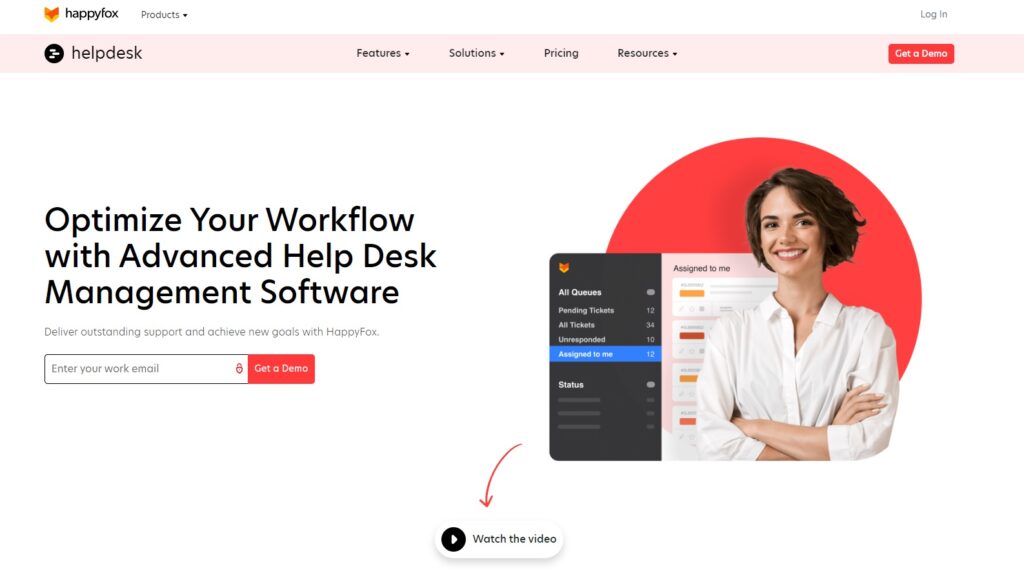
HappyFox does not offer a free version, but you can try the system out during a 14-day free trial.
Pros
- The platform is intuitive and easy to use
- The system is easy to customize to your needs
- Extensive reporting and analytics
Cons
- Downtimes may be disruptive
- Pricing is can get quite expensive
- Missing notification tab
HappyFox pricing
HappyFox comes with two main pricing options. The agent-based pricing includes four pricing packages: Mighty for $29 per agent/month billed annually, Fantastic for $49 per agent/month billed annually, Enterprise for $69 per agent/month billed annually, and Enterprise Plus for $89 per agent/month billed annually.
The pricing regardless of the number of agents consists of four more tiers. The Starter plan costs $1,499/month billed annually, the Growth plan costs $1,999/month billed annually, the Scale plan costs $2,999/month billed annually, and the Scale Plus plan costs $4,999/month billed annually.
If you would like to test the software before making a purchase, you can give HappyFox a go with their 14-day free trial.
Author’s opinion
HappyFox comes with a user-friendly interface as a standout feature, making it easy to navigate through the system, even for those who aren’t particularly tech-savvy. The ticketing system is efficient and well-organized, allowing for easy tracking and management of customer requests.
HappyFox’s mobile app could use some improvements. It lacks some of the functionality of the desktop version, which can be frustrating when trying to manage service tickets on the go.
Another area where HappyFox could improve is its pricing structure. While the software offers a range of useful features, it is on the pricier side compared to other help desk solutions on the market.
While there are areas for improvement, for many, the positives outweigh the negatives, making it a great solution for businesses around the world.
8. Freshdesk
Freshdesk is a cloud-based customer service software that helps businesses manage interactions with their customers. This solution forms part of the larger Freshworks suite, extending its functionality beyond customer support to sales, marketing and IT service management.
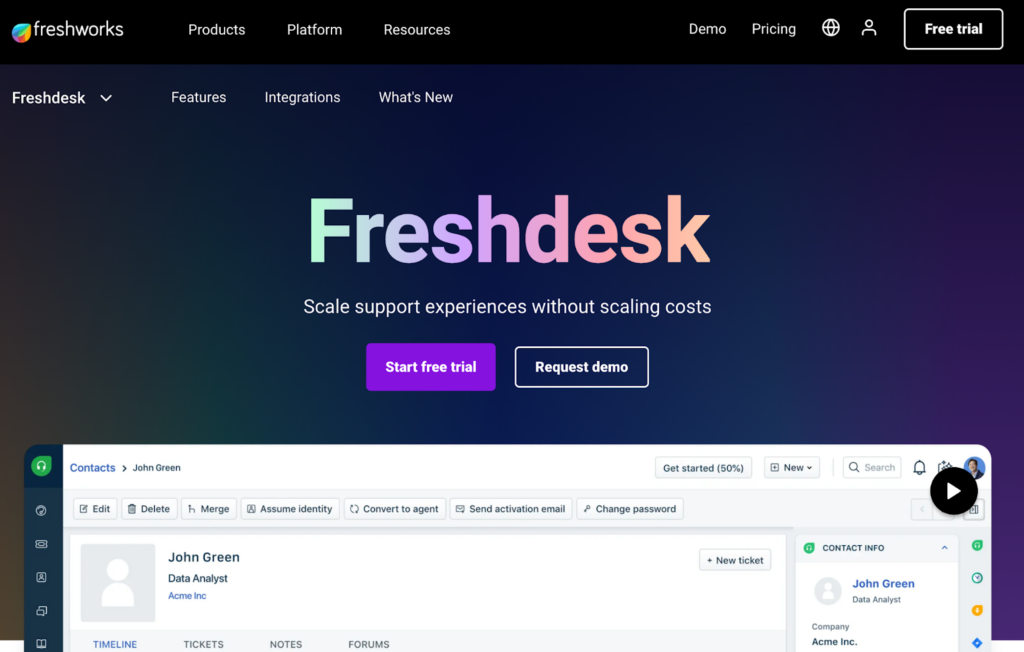
Freshdesk free plan features
Let’s look at some of the features available in Freshdesk’s free plan.
- Integrated ticketing across email and social
- Knowledge base
- Ticket dispatch
- Team collaboration
- Analytics and reporting
- 24×7 email support
Freshdesk free plan limitations
Here are some of the features you can find in higher paid tiers:
- Automation
- Collision detection
- Custom metrics
- Community forums
- SLA management and business hours
Pros
- The interface is clean and easy to use
- Substantial number of integrations
- Detailed reporting features
Cons
- It can be occasionally slow or unresponsive
- Limited customization options
- Routing tickets can be a bit finicky
Freshdesk pricing
Freshdesk offers a support desk solution that comes with a free plan, accommodating up to 10 agents, albeit with certain restrictions. If you’re interested in upgrading, you can opt for the following plans: Growth priced at €15, Pro for€49, or Enterprise €79 per agent per month, billed yearly. Additionally, you have the option to purchase some extra add-ons.
Before committing to a paid plan, you can opt for Freshdesk’s 14-day free trial.
Author’s opinion
The first thing to point out about Freshdesk is its user-friendly interface. It makes navigating the system and using different features and tools a breeze. Freshdesk’s ticketing system is efficient, allowing for easy tracking and management of customer queries. The automation feature is also commendable, as it helps in streamlining tasks and improving productivity.
However, Freshdesk is not without its shortcomings. One of the main issues I encountered was the occasional lag in the system. This could sometimes slow down work, and drive people to look for solutions alternative to Freshdesk.
The reporting and analytics feature of Freshdesk is quite impressive. It provides detailed insights into customer interactions, which can be instrumental in making data-driven decisions. The software also integrates well with other platforms, making it easier to centralize operations.
All in all, while Freshdesk has its drawbacks, its benefits outweigh them. It’s a reliable tool for managing customer support, with a range of features designed to enhance efficiency and productivity.
9. SysAid
SysAid is a help desk software solution designed to streamline IT service management. The software is accessible via cloud and on-premise deployments, and the company strives to revolutionize the way IT help desks operate.
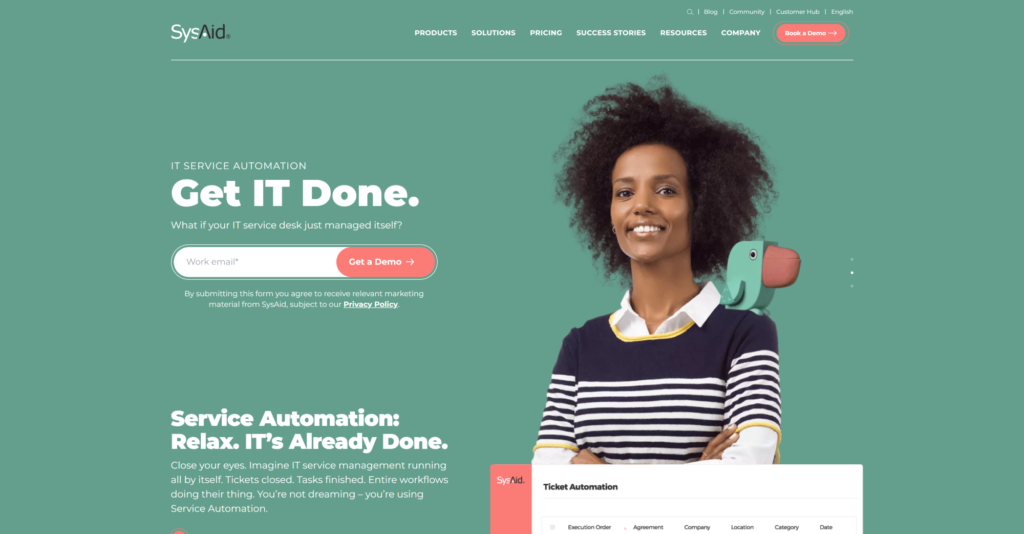
SysAid does not offer a free plan. However, you can test the software out during a free trial period.
Pros
- The software is very intuitive and easy to use
- It is a great tool for monitoring ITIL standards and procedures
- Customizable self-service portal
Cons
- The system comes with a steep learning curve
- Knowledge base management doesn’t provide a comprehensive usage report
- Occasional post-update issues
SysAid pricing
SysAid’s pricing isn’t available to the public and requires you to contact their team.
SysAid offers a free trial to test out their software.
Author’s opinion
SysAid is a comprehensive IT service management solution that offers a wide range of features. The software is user-friendly with a clean and intuitive interface, making it easy to navigate even for first-time users. It offers robust ticket management, asset management, and reporting capabilities.
However, SysAid comes with some drawbacks. The software can be quite complex and overwhelming, especially for small businesses that may not require such extensive features. The initial setup and customization process can be time-consuming and requires a certain level of technical expertise. Additionally, the mobile app could use some improvements in terms of functionality and user experience.
In terms of customer support, SysAid offers a mixed bag. While their support team is generally responsive and helpful, there have been instances where the resolution time was longer than expected. This can be frustrating when you’re dealing with critical issues that need immediate attention.
Overall, SysAid can be a great choice for medium to large businesses looking for a comprehensive IT service management solution. Despite its shortcomings, SysAid offers a robust set of features that can greatly improve the efficiency and effectiveness of your IT team.
10. Zendesk
Zendesk is a customer service software company that provides a cloud-based help desk solution to more than 50,000 customers worldwide. It’s designed to improve customer satisfaction and boost productivity among support teams.
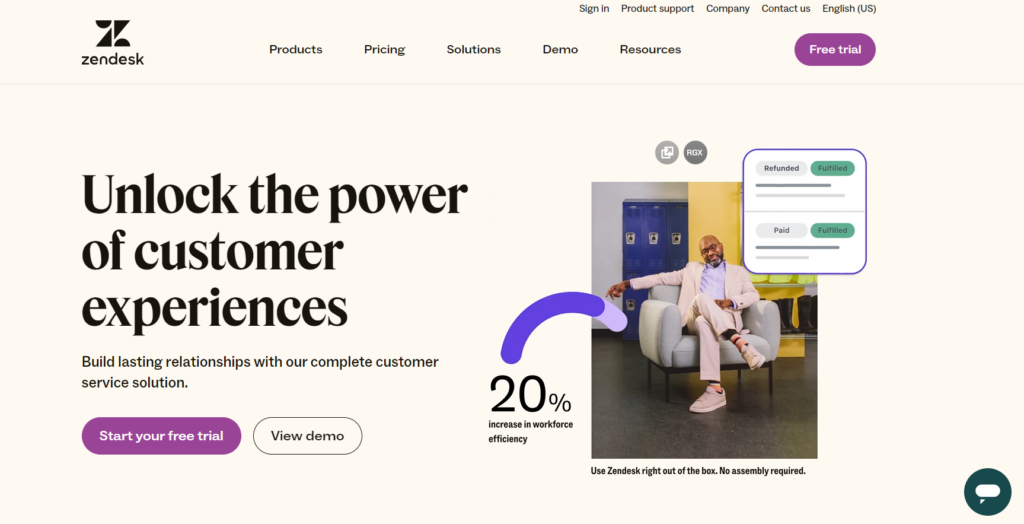
Zendesk does not offer a free version, but you can still test it out for free during a free trial.
Pros
- User interface is pleasant and intuitive
- Extensive customization options
- Efficient automation options
Cons
- Insufficient customer support
- The pricing can get quite expensive
- The system may be very challenging to use if not set up correctly
Zendesk pricing
If you’re thinking about using Zendesk, there are four different pricing options available. The Support Team plan is priced at €19 per agent each month, the Suite Team plan is €55 per agent monthly, the Suite Growth plan is €89 per agent per month, and the Suite Professional plan is €115 per agent every month. For a quote on Zendesk’s highest tier plan, the Enterprise, you’ll need to get in touch with their sales department. You also have the opportunity to test Zendesk with a free trial for 14 days before deciding on a subscription.
Author’s opinion
Zendesk is a well-known help desk and ticketing solution. Its user-friendly interface is one of its strongest points, making it easy to navigate through the system, track customer interactions, and manage tickets.
As with any other, this software has its downsides. One of the main issues setting everything up correctly right in the beginning. For instance, configuring the automation and triggers can be quite challenging, especially for non-tech savvy users. If you do not manage to set the system up properly from the get-go, you may find yourself struggling later on.
Another downside is the cost. While Zendesk offers a variety of plans, the pricing can be steep, especially for small businesses. The more advanced features are only available in the higher-tier plans, which may not be affordable for everyone.
Zendesk is a powerful help desk software with a wide range of features that can greatly enhance customer service efficiency. However, its complex setup and high cost can be a deterrent for some users.
11. Spiceworks
Spiceworks offers a free of charge cloud-based help desk system designed to improve customer problem resolution. The software also includes an IT-specific tool set for managing networks and devices.
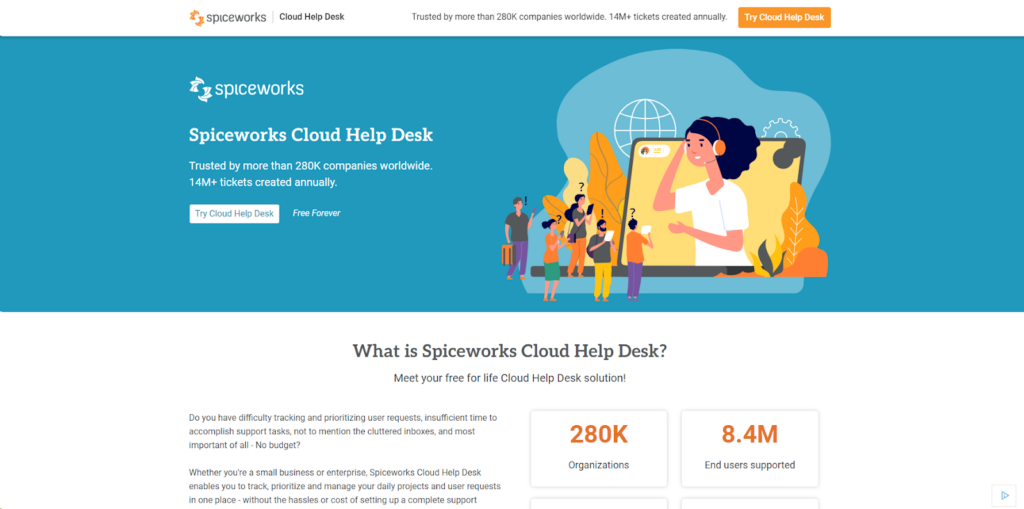
Spiceworks free plan features
Some of the features included in Spiceworks’ free plan include:
- Ticket management
- Ticket routing
- Dashboards
- Native mobile app – Android & iOS Apps
- In-depth reports
- Knowledge base
Pros
- The system is easy to install and operate
- Accessible asset management system
- The software is entirely free
Cons
- Some advanced features are missing
- It includes ads
- The support is community-driven
Spiceworks pricing
The entire system is free of charge.
Author’s opinion
Spiceworks help desk software is a free tool that is particularly beneficial for those in the IT sector. It offers a comprehensive set of features that streamline the process of managing, tracking, and resolving IT issues. The user interface is intuitive and easy to navigate, making it simple to assign tasks, monitor progress, and communicate with team members. The software also includes a built-in inventory system, which is a great asset for managing hardware and software assets.
One of the main issues with this solution is the occasional lack of support. Spiceworks operates on a community-driven approach, which means that sometimes, when you encounter a problem or need assistance, you’re reliant on other users for help. This can be frustrating when you need immediate assistance or when the community doesn’t have the answers you need.
Another downside to Spiceworks help desk software is the inclusion of ads. While it’s understandable that the presence of ads helps keep the software free, they can be distracting and somewhat intrusive when you’re trying to focus on resolving IT issues.
All in all, Spiceworks’ software is a robust and cost-effective solution for IT issue management. Despite the occasional lack of support and the presence of ads, its comprehensive features and user-friendly interface make it a valuable tool for many IT professionals.
12. Groove
Groove is a help desk software designed to simplify customer support processes, streamline workflow, and enhance client relationships. Groove is utilized in 120+ countries worldwide by thousands of teams, serving over 2,000 growing businesses.
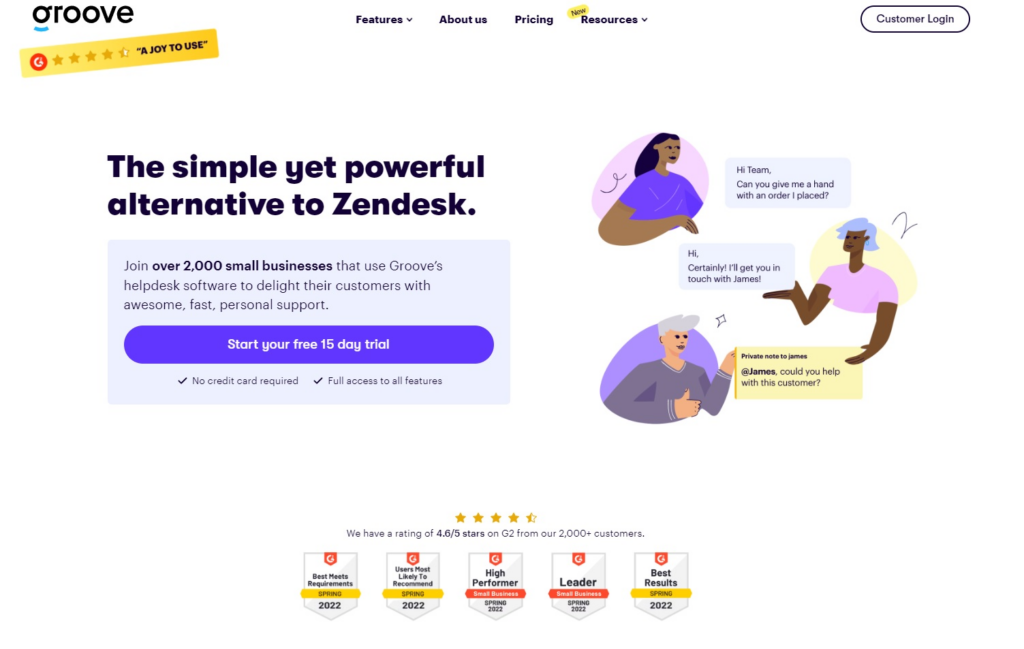
Groove free plan features
Groove does not offer a free version of their software. However, you can give it a test drive during a free trial period.
Pros
- Powerful integration with Salesforce
- Multiple inboxes in a single account
- The system is very easy to use
Cons
- Limited customization options
- Limited reporting capabilities
- The interface can be slow at times
Groove pricing
Groove offers three subscription plans for you to consider: the Standard plan at $12 per user/month, the Premium plan at $20 per user/month, and the Advanced plan at $40 per user/month.
Additionally, Groove provides a 7-day free trial for you to familiarize yourself with its features and functionalities.
Author’s opinion
Groove’s help desk is a user-friendly platform that offers a streamlined approach to customer service. Its interface is intuitive and easy to navigate, making it simple to manage customer inquiries, track tickets, and monitor customer interactions.
One of Groove’s downsides is the software’s reporting capabilities. While Groove does provide basic reporting features, they are quite limited and lack the depth and customization options provided by other platforms. This can make it challenging to gain a comprehensive understanding of customer service and agent performance and identify areas for improvement.
Overall, Groove is a solid choice for small to medium-sized businesses looking for straightforward, easy-to-use help desk software. However, for larger businesses or those requiring more advanced features and in-depth reporting, it may not be the most suitable option.
13. Mint Service Desk
Mint Service Desk is a versatile and customizable help desk software designed to improve customer support operations. It allows for seamless integration with other systems, providing a unified platform for handling customer inquiries. The software’s asset management capabilities set it apart from other help desk software.
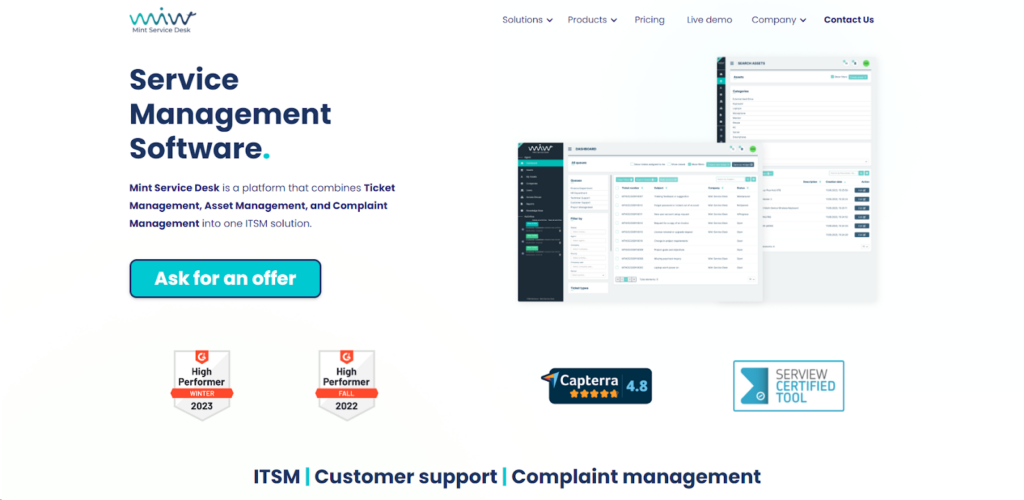
Mint Service Desk free plan features
Mint Service Desk does not offer a free version of their system. However, you can sign up for a free trial and get acquainted with the software.
Pros
- ITIL certification
- Advanced asset management features
- The system is very flexible
Cons
- UI is a bit outdated
- It comes with a steeper learning curve
- The system needs some UX improvements
Mint Service Desk pricing
Besides a free trial, Mint Service Desk offers three main pricing tiers: MintSD Lite, MintSD Pro, and MintSD Enterprise. To get a quote for each of these pricing plans, contact Mint Service Desk’s team.
Author’s opinion
Mint Service Desk is a robust help desk and asset management software. The ticketing system is particularly impressive, allowing for easy tracking and management of customer issues. The software also integrates well with other platforms, which greatly enhances its functionality and convenience.
To look at the downside, the steep learning curve can be some of a deterrent. While the interface is user-friendly, albeit a bit outdated, the software itself is quite complex, and it takes a while to fully understand and utilize all its features.
The customer support provided by Mint Service Desk is commendable. However, the lack of a comprehensive user manual or tutorial can make the initial stages of using the software quite challenging.
To sum it up, Mint Service Desk is a powerful help desk software with a range of impressive features. However, its complexity may pose challenges for some users.
14. Hiver
Hiver is a cloud-based customer support software that integrates with Gmail to convert emails into trackable tickets. Without altering the existing workflow, Hiver turns Gmail into a powerful help desk. It is used by more than 10,000 teams around the world.
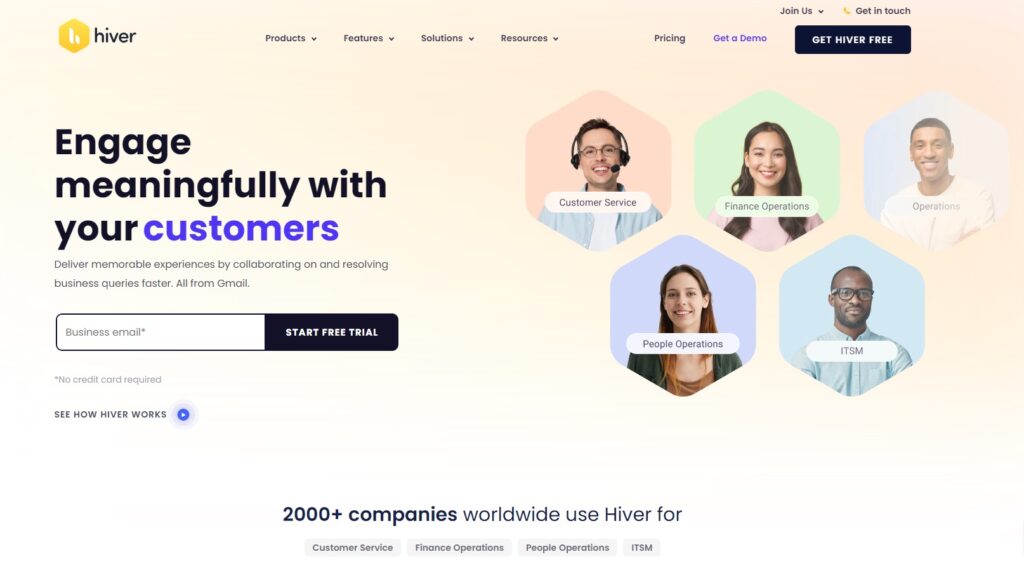
Hiver free plan features
Hiver’s solution isn’t available in a free plan, however, you can try it out by signing up for a free trial.
Pros
- Seamless G Suite integration
- Advanced email analytics
- Reliable customer support
Cons
- Some advanced features are missing
- The interface can be a bit clunky
- Insufficient mass actions functionality
Hiver pricing
If you’re thinking about subscribing to a paid plan from Hiver, you have the option to choose the Lite package at $15 per user/month, the Pro package at $39 per user/month, or the Elite package at $59 per user/month. To test the platform, Hiver offers a 7-day free trial.
Author’s opinion
Hiver is a help desk software that I have found to be quite effective in managing customer support. Its integration with G Suite is particularly impressive, allowing for seamless collaboration and communication. The shared inbox feature is a standout, enabling multiple team members to access, manage, and respond to customer emails from a single platform.
Of course, Hiver is not without its drawbacks. The user interface, while generally intuitive, can be a bit clunky and confusing at times. Additionally, the software lacks some advanced features that other help desk solutions offer, such as a robust ticketing system and detailed analytics.
While Hiver has its shortcomings, its strengths, particularly its G-Suite integration and automation capabilities, make it a great choice for managing customer support. It may not be the most feature-rich help desk software on the market, but it does a good job of simplifying and streamlining the customer service process.
15. SolarWinds
SolarWinds is a well-established IT management software provider that offers help desk solutions, known as Web Help Desk and Service Desk. The software aids businesses in managing, tracking and solving IT support cases.
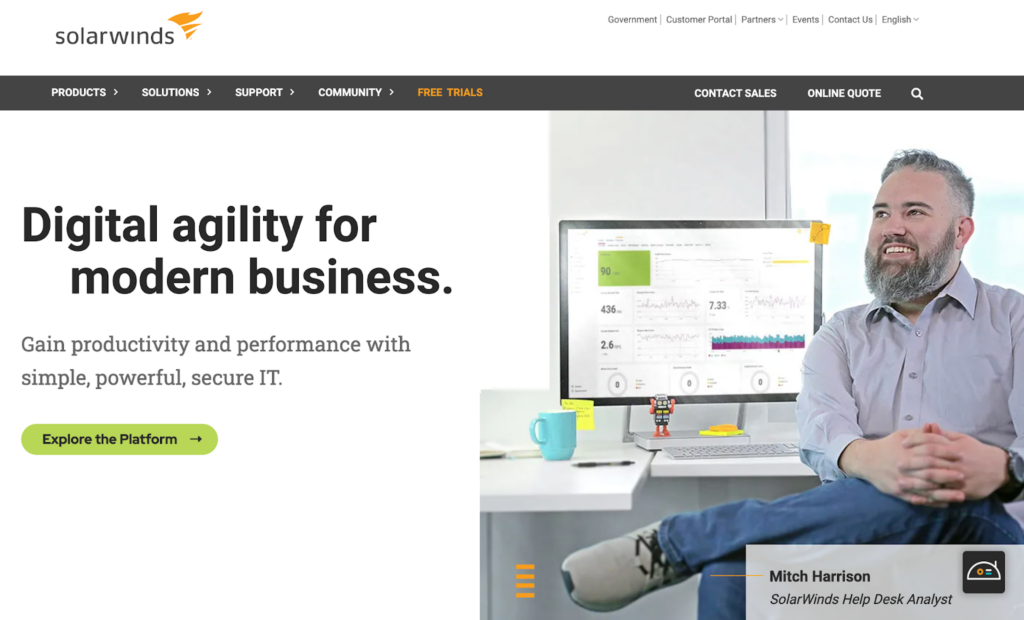
SolarWinds free plan features
Although SolarWinds doesn’t offer an entirely free plan, the suite of their free tools include help desk. Let’s look at some of its features.
- Ticket management
- Incident and problem management
- SLA management
- Help Desk performance reporting
- AD and LDAP synchronization and account management
- Built-in knowledge base
SolarWinds free plan limitations
And now let’s look at some of the features behind a paywall:
- Help Desk task automation
- Automated IT asset discovery
- Change management and change approval process
- Parts and inventory management
- Integration with remote support and remote control software
Pros
- The system is highly customizable
- The software follows ITIL practices
- Efficient incident management
Cons
- Difficult configuration process
- Requires substantial training to use effectively
- The reporting feature can be difficult to navigate
SolarWinds pricing
SolarWinds’ pricing is somewhat confusing. You can either request a quote, or build your own custom quote. Then, there is a suite of tools, some of them free and some of them are behind a paywall. Therefore, the final quote is highly dependent on the tools you need.
SolarWinds offers a free trial, so you can test their services out for yourself.
Author’s opinion
SolarWinds’ software is designed to streamline IT service management, and it does so quite effectively. The ticketing system is intuitive and easy to navigate, allowing for efficient tracking and resolution of issues. The asset management feature is also quite useful, providing a clear overview of all hardware and software assets.
On the other hand, the user interface, while functional, is not the most visually appealing or user-friendly. It can take some time to get used to the layout and to locate certain features. Additionally, the reporting feature, while comprehensive, can be quite complex to use. It requires a certain level of technical knowledge to fully utilize.
Another positive aspect of SolarWinds is its scalability. It can easily accommodate the needs of both small businesses and large corporations. The software also offers a variety of customization options, allowing users to tailor the system to their specific needs. The integration with other SolarWinds products is also a plus, providing a more holistic approach to IT management.
All in all, while SolarWinds help desk solution has its shortcomings, particularly in terms of user interface and complexity of certain features, its comprehensive functionality and scalability make it a solid choice for IT service management.
16. SupportBee
SupportBee is a help desk software designed to simplify and improve customer support operations. What sets it apart is its focus on providing a user-friendly interface mimicking standard email clients, avoiding complex ticket systems.
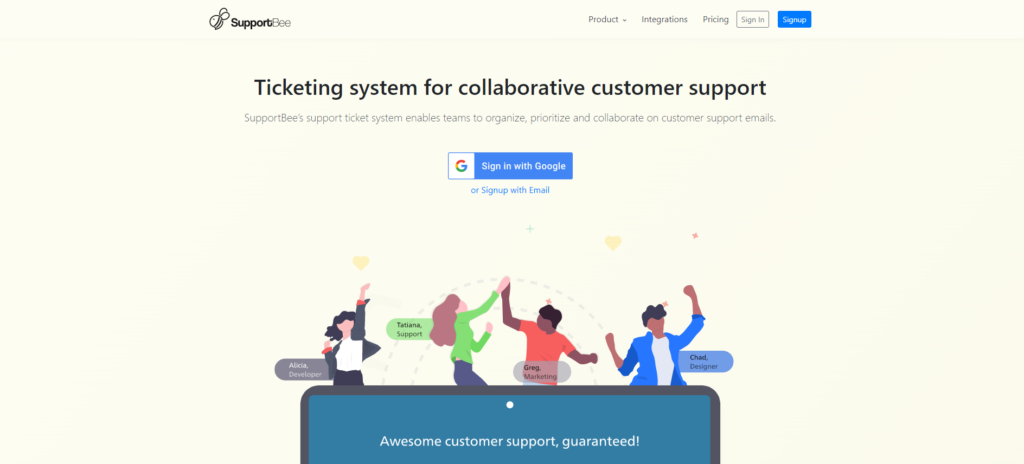
SupportBee free plan features
SupportBee doesn’t offer a free version, but you can try it out by signing up for a free trial.
Pros
- User-friendly and intuitive interface
- Very easy and accessible onboarding
- Outstanding after-sales support
Cons
- Insufficient reporting capabilities
- Insufficient customization options
- The system is a bit laggy
SupportBee pricing
SupportBee’s software is available in two main pricing packages: Startup costs $13 per user/month, or Enterprise costs $17 per user/month, both billed annually.
Before committing to a paid plan, you can get acquainted with the system during a 14-day free trial.
Author’s opinion
SupportBee is a user-friendly help desk software with a clean and intuitive interface, making it easy to navigate and track customer queries. The software also integrates well with other platforms such as Slack, making it convenient to use within a team setting. The ticketing system is well-structured, allowing for easy categorization and prioritization of customer issues.
However, one of the SupportBee’s downsides is the lack of a robust reporting feature. While it does provide basic reporting, it falls short when it comes to providing detailed analytics that can help in making data-driven decisions. This can be a significant drawback for businesses that rely heavily on data analysis for their customer support strategy.
Another issue I’ve encountered is the occasional lag in the system. There have been instances where the software becomes slow, especially when handling a large volume of tickets. This can be quite frustrating when you’re trying to resolve customer issues promptly.
Despite the issues, SupportBee can be a good choice for small to medium-sized businesses. However, larger organizations might find it lacking in certain aspects.
17. Hesk
Hesk is a help desk software solution designed to streamline customer service requests. Hesk has been serving businesses globally for more than 18 years, making it a long-standing player in the help desk software market.
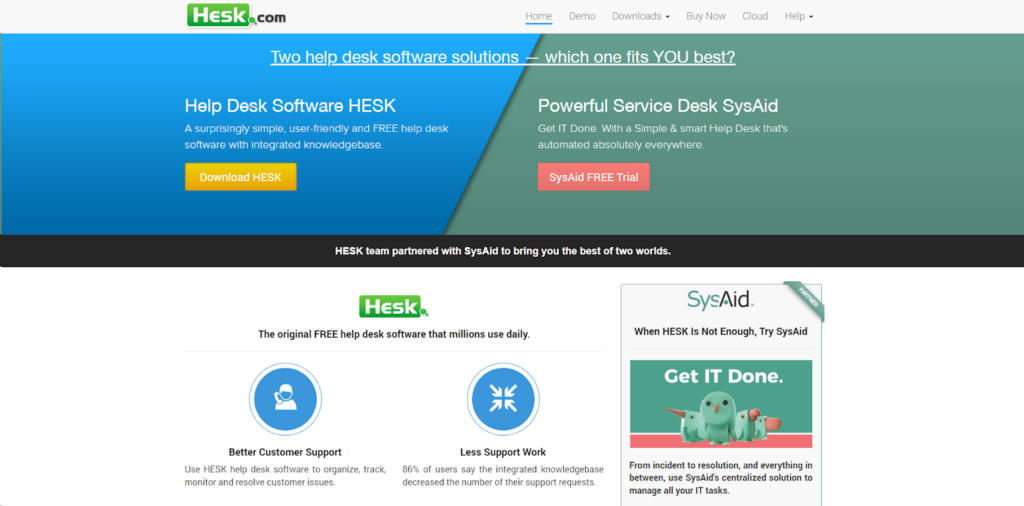
Hesk features
Let’s look at some of the features included in Hesk’s tool belt.
- Ticketing system
- Ticket categories
- Web forms
- Canned responses
- SPAM prevention
- Knowledge base
Pros
- Easy setup process
- Simple creation of knowledge base articles
- The system caters to more and less tech-savvy users
Cons
- Customization can be challenging
- Some features require technical expertise
- The system needs some UI improvements
Hesk pricing
Hesk’s software is entirely free of charge.
Author’s opinion
Hesk help desk software offers a range of features designed to streamline customer service operations. The ticketing system is particularly impressive, allowing for easy tracking and management of customer queries. The software also provides a knowledge base feature, which is a great tool for providing customers with self-service options.
Of course, this solution is not perfect. The customization options are quite limited, which can be frustrating if you’re looking to tailor the software to your specific needs. The reporting feature also leaves a lot to be desired. While it does provide basic reports, it lacks the depth and detail that other help desk software offers.
In terms of performance, Hesk is generally reliable, but there have been instances where the software has been slow to respond. This can be a significant issue when dealing with a high volume of customer queries. The customer support provided by Hesk is also a mixed bag. While they are generally responsive, there have been instances where it took longer than expected to get a response.
Overall, Hesk is a solid help desk software, mainly for those on tight budgets. It’s not without its flaws, but in its strength in ticket management, it’s a viable option for small to medium-sized businesses. However, larger organizations or those requiring more detailed reporting and customization may want to consider other options.
18. Kayako
Kayako is a help desk software designed to streamline customer service processes. With automation features, it aids in tracking, prioritizing, and solving customer support tickets. Kayako has been serving businesses globally for over 20 years since its inception in 2001.
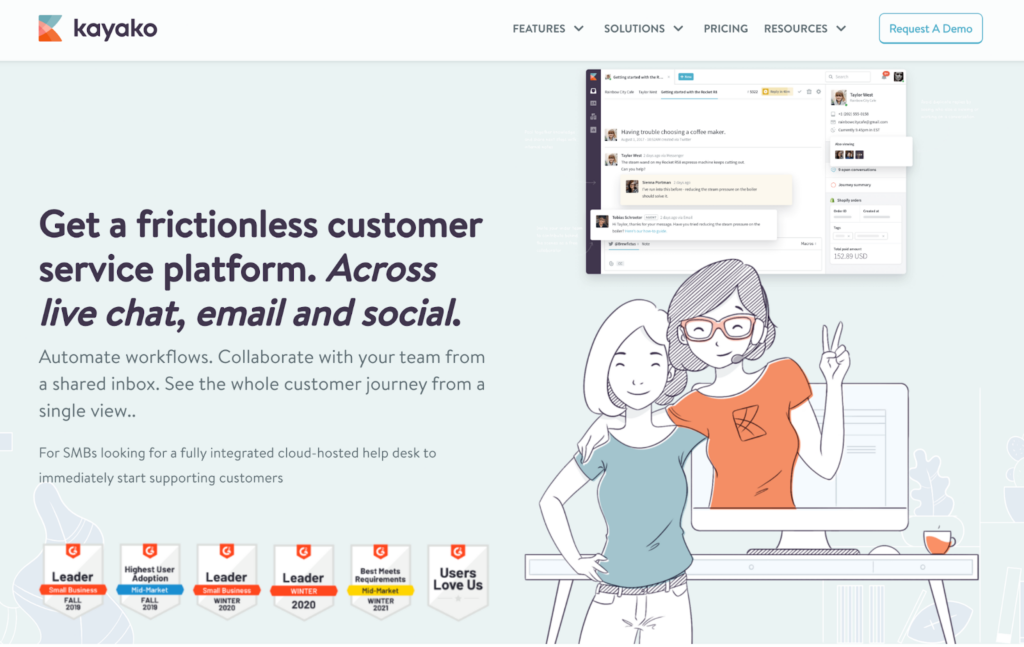
Kayako free plan features
Kayako doesn’t offer a free version, but you can try it out by signing up for a free trial.
Pros
- Integration with multiple platforms
- User-friendly interface
- Reliable ticketing functionality
Cons
- Limited customization options
- The system lacks advanced reporting capabilities
- The system occasionally laggy
Kayako pricing
To get a quote on Kayako’s cloud or on-premise solution, contact their sales team.
For those interested in a test run, Kayako offers a free 14-day trial.
Author’s opinion
My experience with Kayako help desk software has been a mixed bag. On the positive side, the software is quite user-friendly with a clean and intuitive interface. It offers a wide range of features such as live chat, email, social media, and phone support, which are all integrated into a single platform. This makes it easier to manage and track customer interactions across multiple channels. The ticketing system is also quite efficient, allowing for easy tracking and management of customer issues.
However, the software is not without its flaws. One of the major drawbacks I’ve encountered is the lack of customization options. While it does offer some level of customization, it’s not as extensive as some other help desk software on the market. This can be limiting, especially for businesses with specific needs.
Another issue I’ve faced is with the software’s performance. There have been instances where the software has been slow to respond, which can be frustrating when you’re trying to resolve customer issues promptly. Additionally, the reporting feature, while useful, could be improved. It provides basic reports, but lacks the depth and detail that would be beneficial for analyzing and improving customer service.
Overall, Kayako is a decent help desk software with a good range of features. However, it could benefit from more customization options and improvements in performance and reporting. It’s a good choice for small to medium-sized businesses, but larger organizations with more complex needs might find it lacking.
Essential features of free help desk software
To function to its fullest, what features should a free help desk software have? Let’s find out.
Ticket management
A ticketing system allows businesses to track, prioritize, and solve customer support queries efficiently. It ensures that no customer query is overlooked and helps in maintaining a high level of customer satisfaction.
For example, customer inquiries about a product defect can be tracked from the time they are received until they are resolved, ensuring the customer is kept informed throughout the process.
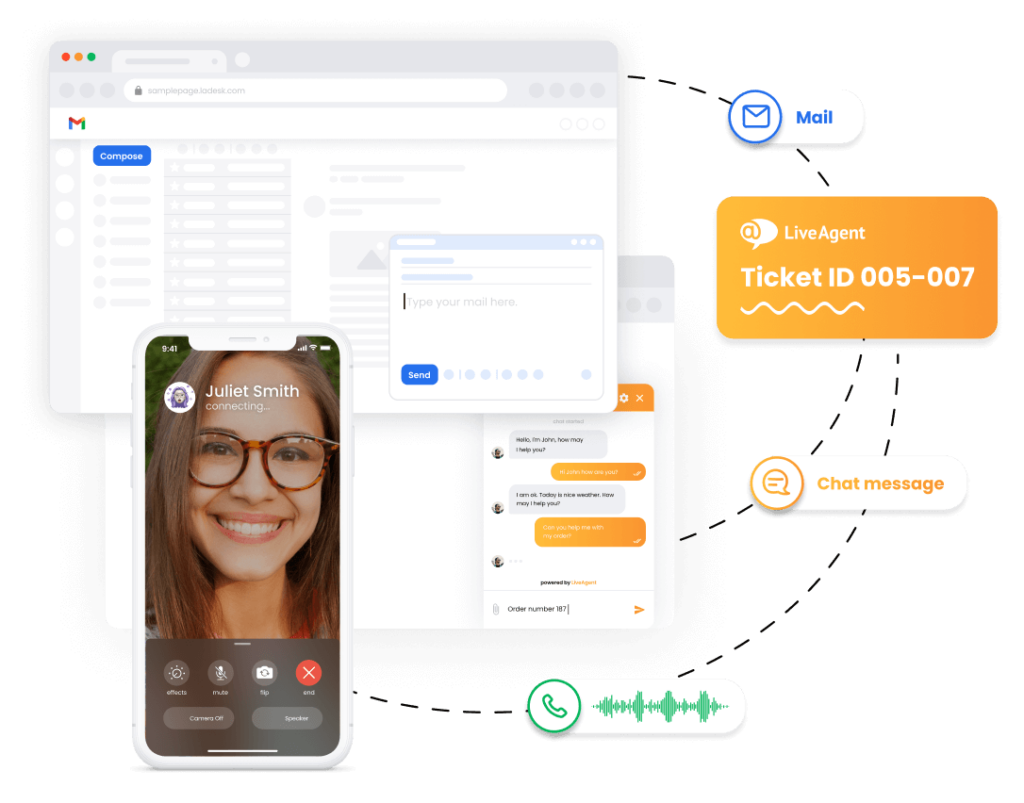
Multichannel support
Free help desk software should offer support across multiple channels like email, phone, social media, and live chat. This feature is important as it allows customers to reach out to the business through their preferred channel, enhancing customer experience.
For instance, a customer who prefers to use social media for communication can easily reach out to the business without having to switch to email or phone.
Knowledge base
Knowledge management using knowledge bases allows businesses to create and manage a repository of information related to their products or services. It helps in reducing the number of support tickets as customers can find solutions to their problems in the knowledge base.
For example, a business can create a detailed guide on how to use a particular product, helping customers to solve their issues without contacting customer support.
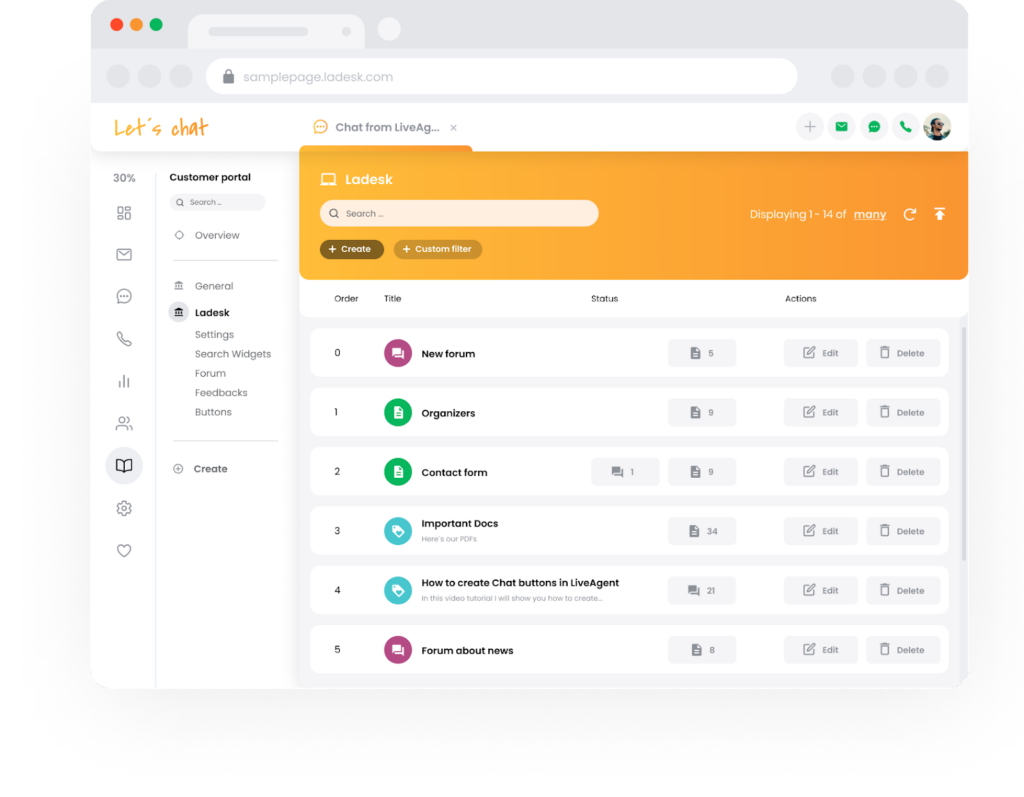
Automation
Such a feature helps in automating repetitive tasks like sorting and assigning tickets, sending follow-up emails, and more. It saves time and allows the support team to focus on more complex issues.
For instance, a business can automate the process of assigning tickets based on the type of query, ensuring that the right team handles the query.
Reporting and analytics
Detailed reports and analytics provide insights into the performance of the support team, customer satisfaction levels, and common issues faced by customers. It helps businesses in making informed decisions and improving their customer support.
For example, a business can identify the most common issues faced by customers and work on improving those areas.
Integration
The ability to integrate with other business tools like CRM, email marketing software, etc., is an essential feature. It helps in streamlining operations and improving efficiency.
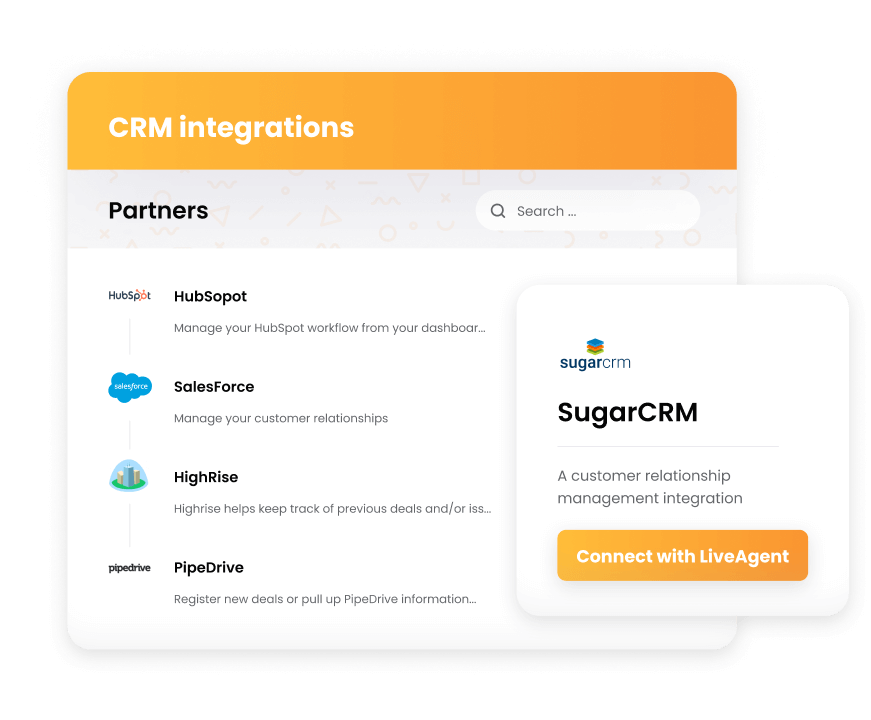
For instance, integration with CRM software can provide the support team with complete customer history, helping them in providing personalized support.
User-friendly interface
A simple and intuitive interface is crucial for both the support team and customers. It reduces the learning curve and improves efficiency.
For example, a user-friendly interface can help a new support team member to quickly learn and start handling customer queries.
How to choose the right free help desk ticketing system? (In steps)
With all the options laid out, let’s talk about a few actionable steps you can take to choose the best free help desk system for your organization.
Step 1: Identify your needs
Before you start looking for a help desk ticketing system, you need to identify what your business needs are. This includes the size of your business, the number of customers you have, the type of issues you typically deal with, and the level of support you need.
Step 2: Research available options
Once you have a clear understanding of your needs, start researching the different free help desk ticketing systems available. Look at their features, customer reviews, and overall reputation. For this step, you can use this article as a guide.
Step 3: Evaluate features
Different systems come with different features. Some of the features to look for include ticket management, automation, reporting and analytics, multichannel support, and knowledge base management. Choose a system that offers the features that are most important to your business.
Step 4: Consider scalability
Your business will grow over time, and so will your needs. Therefore, it’s important to choose a system that can scale with your business. Even though you’re looking for a free system, many offer premium plans that you can upgrade to in the future.
Step 5: Test the system
Most free help desk ticketing systems offer a trial period. Use this time to test the system and see if it meets your needs. Pay attention to its ease of use, functionality, and reliability. When selecting free help desk software, prioritizing security customer service is essential to safeguard sensitive customer data and maintain trust.
Step 6: Check customer support
Even though you’re using a free system, you still want to ensure that you’ll have access to customer support when you need it. Check what kind of support the provider offers and read reviews to see what other users have to say about their support experience.
Step 7: Pick the right solution for you
After you’ve tested a few systems and evaluated their features, scalability, and customer support, it’s time to make a decision. Choose the system that best meets your needs and start implementing it in your business.
Benefits of free ticketing systems
Free help desk tools come with a myriad of benefits. Below, we’re going to discuss the most significant ones.
1. They are cost-effective
The most obvious benefit of a free ticketing system is that it is, well, free. This means that businesses, especially small ones or startups, can save money on software costs.
For example, a small event management company can use a free ticketing system to manage their event registrations without having to invest in expensive software.
2. They are easy to use
Most free ticketing systems are designed to be user-friendly. This means that even people with little to no technical knowledge can use them effectively.
For instance, a non-profit organization can use a free ticketing system to manage their charity event registrations without needing to hire a technical expert.
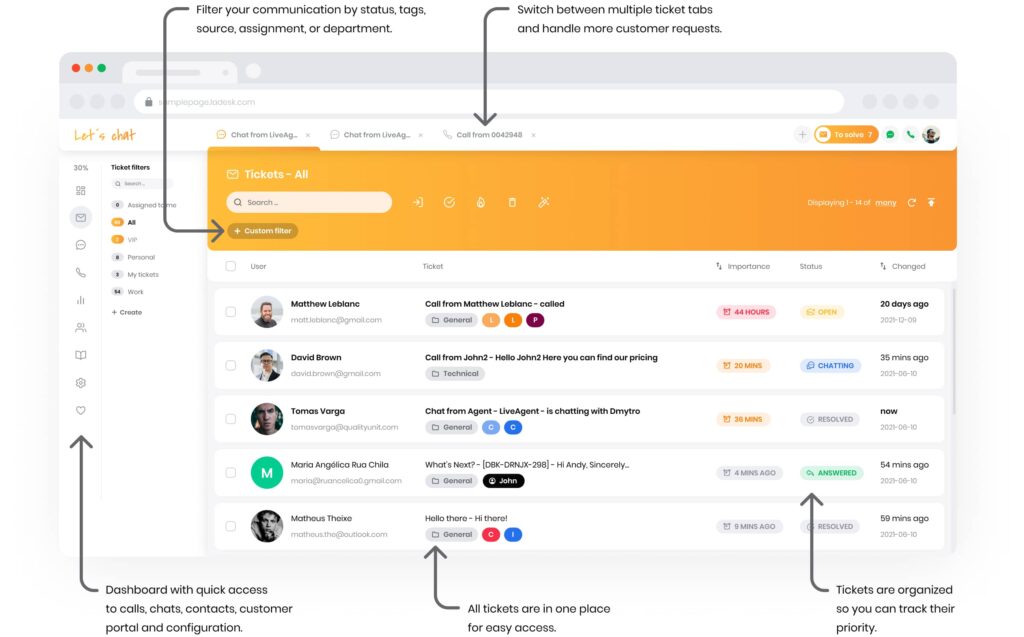
3. They are scalable
Free ticketing systems often allow for scalability. This means that as your business grows, the system can grow with it.
For example, a small music festival can start with a free ticketing system and as the festival grows in popularity, the system can handle the increased ticket sales.
4. They offer automation
Many free ticketing systems offer automation features. This can help to streamline processes and save time.
For example, a conference organizer can set up automatic email confirmations for ticket purchases, reducing the amount of manual work required.
5. They aid in data collection
Free ticketing systems often include features that allow for data collection. This can provide valuable insights into customer behavior and preferences.
For example, a SaaS company can track which of their software solutions are most popular among their clients and at what times they are most used. This data can help them to plan future software updates and new product launches more effectively.
6. They help provide excellent customer service
Using a ticketing system can improve customer service by ensuring that all customer inquiries and issues are tracked and resolved in a timely manner.
For example, a travel agency can use a ticketing system to manage customer inquiries about flight bookings, ensuring that no inquiry is missed, and every customer receives a prompt response.
Drawbacks of free ticketing systems
As with everything in life, free ticketing and help desk solutions come with their own set of drawbacks.
1. Limited features
Free ticketing systems often come with limited features compared to their paid counterparts.
For example, they may not offer advanced reporting or analytics, integration with other software, or customization options. This can limit the efficiency and effectiveness of your customer service operations.
2. Lack of support
Free ticketing systems may not provide the same level of customer support as paid versions. If you encounter a problem or need help using the system, you may be left to figure it out on your own or wait for a long time for a response from the support team.
For example, some free ticketing solutions rely on community support.
3. Advertisements
Some free ticketing systems are supported by advertisements, which can be distracting and seem unprofessional.
For example, your customers may see ads when they submit a ticket or receive a response, which can detract from their experience with your company.
4. Security concerns
Free ticketing systems may not offer the same level of data security as paid versions. This could put your company’s and customers’ information at risk.
For instance, a free ticketing system might not have robust encryption or may store data on insecure servers.
Signs that you need to upgrade your free help desk software
While free help desk software can be a great starting point for small businesses or startups, there comes a time when an upgrade becomes necessary to maintain efficiency and customer satisfaction. Here are some signs that it might be time to consider upgrading your free help desk software.
- Firstly, if your business is experiencing a significant increase in customer inquiries, it might be time to upgrade. Free help desk software often has limitations on the number of tickets or inquiries it can handle at a time. If you’re consistently hitting these limits, it’s a clear sign that your current software is no longer sufficient.
- If you’re noticing a decrease in customer satisfaction, it could be due to the limitations of your free help desk software. Customers today expect quick and efficient service. If your software is slowing down your response times or making it difficult to manage inquiries, it could be negatively impacting your customer satisfaction ratings.
- As your business expands, and you’re hiring more customer service representatives, you’ll need a help desk software that can accommodate this growth. Free software often has limitations on the number of users, and you don’t want your software to be a bottleneck in your growth.
- Lastly, if you’re finding that your free help desk software lacks essential features that your business needs, such as advanced reporting or integration with other business tools, it’s a clear sign that an upgrade is in order.
While the thought of upgrading your help desk software might seem daunting, it doesn’t have to break the bank. There are affordable options out there that offer a great balance between cost and functionality. One such option is LiveAgent’s help desk software, which offers one of the most cost-effective plans in the market.
LiveAgent provides a comprehensive suite of features and 220+ integrations that can help streamline your customer service operations, without being overly expensive. It’s a scalable solution that can grow with your business, ensuring that you’re always equipped to provide top-notch customer service.
Conclusion
Choosing the right help desk and ticketing software can significantly impact your business’s customer service operations. While free solutions can be a great starting point, it’s important to remember that they may not always provide the comprehensive features and support that growing businesses need.
Remember, the right help desk software should not only meet your current needs, but also be scalable to accommodate your future growth. It should offer features like ticket management, multichannel support, knowledge base, automation, reporting and analytics, integration, and a user-friendly interface.
If you’re considering upgrading your free help desk software, LiveAgent offers a cost-effective solution with a comprehensive suite of features. It’s a scalable solution that can grow with your business, ensuring that you’re always equipped to provide top-notch customer service. To see if LiveAgent is the right fit for your business, why not take advantage of their 30-day free trial?
In the end, the goal is to enhance your customer service experience, and the right help desk software can make all the difference. Choose wisely, and your business will reap the benefits.
Want to learn more?
If you own a small business or have just started one, our article highlights the top help desk software options. Discover how to choose the right help desk software for small business without breaking the bank and find the perfect fit for your needs.
Expand your knowledge even further by learning more about the difference between service desk and help desk. Here, you’ll find out the key distinctions between the two, learn about the benefits each one offers, and discover which option may be more suitable for your business based on your needs and requirements.
Ready to revolutionize your customer service?
Try LiveAgent's ticketing software today and experience seamless, efficient customer support like never before!
Frequently Asked Questions
What is the most important help desk feature?
One of the most important features of any help desk software is a help desk ticketing system. Such a system organizes all interactions between a company and its customers by turning these interactions into unified tickets.
What does the term ticketing system mean?
The term ticketing system refers to all the applications that automatically; administer, manage, process, classify, authorize, and organize incidents. These incidents are turned into tickets that are generated internally by employees or externally by customers.
What information does a ticket include?
Each ticket should store information about the inquiry and the customer’s contact information, such as customer name, date, and time of contact.
How long does it take to fully implement free help desk software?
Fully implementing free help desk software can vary greatly depending on the complexity of the software, the size of the organization, and the technical skills of the team. On average, it can take anywhere from a few hours to a few weeks. However, it's important to note that ongoing training and adjustments may be needed as the team gets used to the new system.
Can you integrate free IT help desk software with your existing tools?
Yes, many free IT help desk software solutions offer integration capabilities with existing tools. However, the extent of integration may vary depending on the specific software and the tools you are using. It's important to check the software's specifications or contact their support for detailed information.
What is a free IT ticketing system?
It’s a tool that helps IT teams manage and resolve issues reported by users or within their systems. It allows for tracking, prioritizing, and solving these issues in an organized and efficient manner. Despite its no-cost nature, it often includes features such as automation, reporting, and integration with other IT management tools.
Is Freshdesk free to use?
Yes, Freshdesk offers a permanently free plan called 'Free' (previously called Sprout) with limited features and functionalities. This plan is available on both the older version of Freshdesk and the new Mint experience. Additionally, users can start a 14-day free trial with no credit card required. Therefore, Freshdesk does have a free plan available for use.
Is Zendesk ITIL compliant?
Introduction to ITIL, a set of IT service management practices that align services with business needs, is necessary. Zendesk, a customer service software company, has aligned their offerings with ITIL practices, offering features and functionalities to support ITIL's key components. While Zendesk provides materials to demonstrate their ITIL alignment and works with ITIL experts, it's critical to conduct an individual assessment to determine suitability. Therefore, while Zendesk endeavors to support ITIL processes, the level of compliance may depend on an organization's specific needs.
Share this article
Best 20 knowledge base software in 2024
Discover the top 20 knowledge base software for 2024, exploring features, benefits, pricing, and expert tips for choosing the best solution for your business. Get insights on how knowledge base software works and a recommendation for LiveAgent's free trial.
Looking for free customer management software?
Discover LiveAgent's free customer management software, offering ticketing, live chat, call center, and knowledge management without any setup fees or credit card requirements. Enjoy 24/7 customer support and a free account forever, helping you stay closer to your customers and increase productivity. Trusted by Forbes, Airbus, and NASCAR, LiveAgent ensures seamless communication and satisfied customers. Start your free trial today!

 Български
Български  Čeština
Čeština  Dansk
Dansk  Deutsch
Deutsch  Eesti
Eesti  Español
Español  Français
Français  Ελληνικα
Ελληνικα  Hrvatski
Hrvatski  Italiano
Italiano  Latviešu
Latviešu  Lietuviškai
Lietuviškai  Magyar
Magyar  Nederlands
Nederlands  Norsk bokmål
Norsk bokmål  Polski
Polski  Română
Română  Русский
Русский  Slovenčina
Slovenčina  Slovenščina
Slovenščina  简体中文
简体中文  Tagalog
Tagalog  Tiếng Việt
Tiếng Việt  العربية
العربية  Português
Português 










